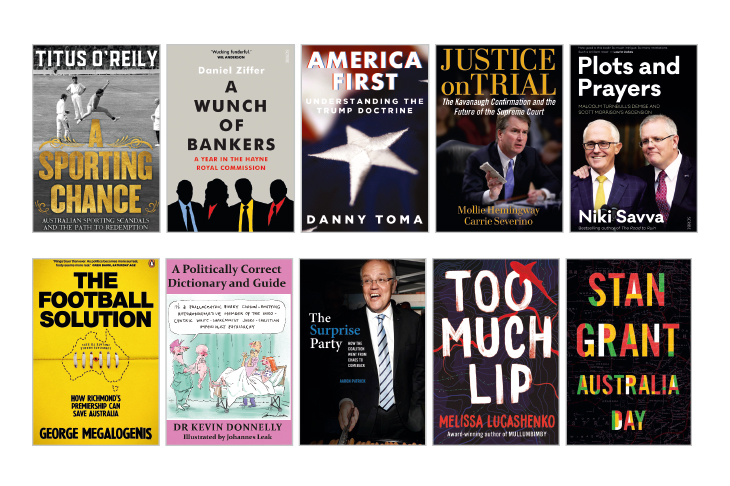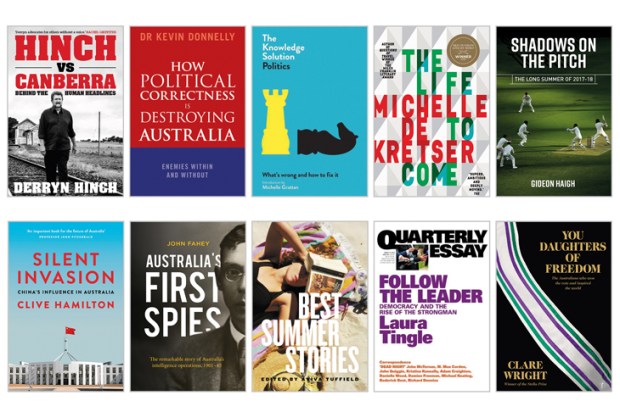The year has been an odd one for books, with some trying to make sense of the political landscape and others trying to avoid the subject altogether. A mixed bag, yes, but one with a lot of good reading.
The dominant event of the year was the federal election. The chattering classes had a rude shock when the Coalition was returned to office, with an increased majority and big smiles. Aaron Patrick, senior writer at the Australian Financial Review, does a good job of explaining how it happened in The Surprise Party: How the Coalition Went from Chaos to Comeback (Black Inc.), to the point that in hindsight it all seems inevitable. There was an arrogant complacency on the Labor side, driven by the public polls. Shorten, never really trusted, was unable to explain key policies. Green radicals helped to bury Labor in Queensland. Morrison, on the other hand, had clear messages and no end of rambunctious energy. He made a genuine connection with working-class voters, thereby changing the political demographics of the country and defining a new middle ground. The central lesson? It’s only over when it’s over.
Titus O’Reily has the endearing quality of not taking himself or anything else too seriously – uncommon amongst sports writers, these days. In A Sporting Chance (Penguin) he rounds up a wealth of cases of sports heroes who have managed to get themselves into trouble, whether it involves cheating on the ground or bad behaviour off the field. Steve Smith, Wayne Carey, Shane Warne, Alan Bond: it’s a long list. Amazingly, they are nearly always forgiven for their transgressions. In some cases it has been because the sports-watching public worries about how their exclusion from a team would impact on results (particularly common with international cricket). Other times have been due to a ‘boys will be boys’ mentality. O’Reily recounts all this with his tongue firmly in his cheek, although he adds that things may be changing, due to cultural shifts and the rise of women’s sports. In any case, A Sporting Chance is an entertaining, off-beat package.
Another book that links sports with larger issues is The Football Solution: How Richmond’s Premiership Can Save Australia (Penguin) by political gadfly George Megalogenis. He argues that the rise of Richmond AFL Club to win the flag in 2017 after a long stretch of doldrums could be a model for both sides of Australian politics. Don’t change leaders as soon as you hit a rough patch, he says. Invest in the future with solid, considered choices. Avoid circular firing squads. It is an interesting view but not entirely persuasive. After all, Richmond did not even make the finals in 2018, although they came back to take the glory in 2019.
Stan Grant is often thought of as an erudite hero of the whining classes but Australia Day (HarperCollins) finds him in a reflective, even-handed mood. Using the controversy over Australia Day as a theme he examines a range of questions about the place of indigenous cultures in modern Australia, adding his personal experiences as well. Somewhere along the line we became entrenched in a blame game, and he admits that some of his own comments in the past might have done more harm than good. There are times when he even sounds like – wait for it – John Howard, searching for ways to unite Australians rather than divide them. He does not come up with concrete answers but says that both sides should, at least, step back from the heated rhetoric and look for compromises. It would be a start.
The idea that people should be able to discuss differences without rancour seems to have evaporated in the US, according to The Rise of Victimhood Culture by sociologists Bradley Campbell and Jason Manning (Palgrave). They trace its origins to about 2012, when several university campuses began to focus more on encouraging left-wing activism rather than teaching. Victim status became a sign of moral worth, with a slicing-and-dicing of society into aggrieved minority groups. White people were defined as inherently oppressive, targets to be attacked and abused. There was an inevitable backlash, and in this sense Trump was an effect and not a cause of the trend of polarisation. Campbell and Manning do not see an obvious way out, although they speculate that maybe the proponents of victimhood culture might eventually grow up and get real jobs. Possible, but not likely.
Justice on Trial: The Kavanaugh Confirmation and the Future of the Supreme Court (Regnery) by Mollie Hemingway and Carrie Severino shows just how much the liberal Left, which once held itself out as the exemplar of due process and reasoned argument, has become mired in its own self-righteousness and venom. There were claims of rape, assault and even paedophilia made against Kavanaugh; some were obviously ludicrous but even the more serious ones failed to stand up under scrutiny. Hemingway and Servino believe that the Left, in its shrieking way, was playing to the public, thinking that they could damage Kavanaugh so seriously that any votes he cast on the Supreme Court would be seen as illegitimate. Kavanaugh’s supporters, on the hand, focused on ensuring there were 51 Senate votes. Ultimately, he was confirmed along party lines, making one wonder about the point of the whole exercise.
Donald Trump has a way of driving his opponents crazy, especially when it comes to foreign policy. Danny Toma, in America First: Understanding the Trump Doctrine (Regnery), argues that Trump’s policies are surprisingly coherent if you care to look. Toma, who has worked in many global hotspots as an on-the-ground official of the State Department, examines Trump’s major speeches as well as his actions. Putting the interests of your own country first is hardly surprising; the surprise is that many of Trump predecessors failed to do so. Some of America’s supposed allies seem to see the US as a giant ATM, producing cash when the right buttons are pushed. Trump admires the military, and is against putting American soldiers in harm’s way for no good reason. He emphasises that it is not the job of the US to clean up other people’s messes. Toma agrees, noting that attempts to do so usually backfire, costing blood and treasure. In the end, Toma says, the strategy is obvious: don’t be a chump.
The Trump era has made the cultural warriors of the Left even more virulent than usual. Kevin Donnelly has written several books about how language and education are the new battlefields, with the advocates of political correctness shouting down anyone they disagree with in the name of what they define as tolerance. Honestly, it would be funny if the effects were not so painful. Donnelly, in his latest foray A Politically Correct Dictionary and Guide (ConnorCourt), ably assisted by cartoonist Johannes Leak, has fun showing how the Left often gets lost in its own circumlocutions, ending up in weird places. Personal favourite: that ‘dairy milk has long been a symbol of white supremacy’. Donnelly makes some serious points in the essays of the second half of the book, and offers strategies for battle. But in the end the most important lesson might be the idea that the best way to fight tin-pot tyrants is to laugh at them.
Justine Nolan and Martijn Boersma, academics at LaTrobe University, have provided a sobering book, Addressing Modern Slavery (NewSouth Books). In its current form, they say, slavery is less about the ownership of people than their exploitation through deceit, intimidation, and coercion. People from under-developed countries are the most likely victims, often tricked into working on farms or in mines, because paying them effectively nothing is more cost-effective than using machinery. Nolan and Boersma also look at the situation in Australia, where there have been many cases of illegal immigrants or others of dubious legal status being exploited. They argue that legitimate businesses have an obligation to monitor contractors and supply chains to identify cases of exploitation, and outline how it can be done. But the nightmare stories stay in the reader’s mind. This is an awful book, and a very important one.
Most government inquiries attract little public attention but the one into the finance system was always going to be different. In A Wunch of Bankers: A Year in the Hayne Royal Commission (Scribe), Daniel Ziffer recounts the many shonky practices and straightout illegalities of the finance business, and how former judge Ken Hayne and his redoubtable counsel Rowena Orr (nickname: Shock & Orr) worked their way through them. The arrogance of many of the key figures in the banks is astonishing, with Ken Henry the undisputed winner. It would be comical if there was not such a long trail of human pain, loss and anguish involved.
The Miles Franklin Award for the year went to Too Much Lip (University of Queensland Press), the sixth novel by Melissa Lucashenko. Set in the fictional town of Durrongo as several generations and branches of an Aboriginal family gather for the funeral of an elder, the key figure is Kerry Salter, who arrives on a stolen Harley. There are various disputes between clan members, and a shadowy (white) property developer hovers in the background. The problem is that no one in the sprawling cast is particularly likeable, and the numerous back stories bog the story down. Lucashenko has a good ear for dialogue and a knack for telling details but the direction and purpose of the story is not always clear. Worthy of the Franklin, but not an easy read.
This reviewer’s annual prize for the most unnecessary book of the year, the Trees Are Dying For This Award, was a difficult choice. A standout contender was Plots and Prayers: Malcolm Turnbull’s Demise and Scott Morrison’s Ascension (Scribe) by Nikki Savva. It is well-researched and efficiently written, the story of the Liberals falling between stools – or, more correctly, stalling between fools – to bumble their way to a plausible outcome. The problem is that it has been overtaken by events. The outcome of the 2019 election turns the book into an historical curio and not much more. Sorry, Nikki, but … who cares?
Nevertheless, Plots and Prayers is not sufficiently unnecessary to take the award. The TADFT guernsey has to go to Jeff Sparrow for his Fascists Among Us: Online Hate and the Christchurch Massacre (Scribe). He spends 132 pages to tell us that people who commit random massacres are nutcases. Thanks, Jeff, we didn’t know that. He tries to knit their Internet rantings into a dangerous network but there aren’t enough of them to amount to a conspiracy (and naming names has led to legal problems with the book). Neither do Sparrow’s attempts to link shooters to the mainstream conservative parties work: they are simply too marginal and deranged. At the same time, he is happy to overlook the alt-left, which has produced violent, well-organised groups like Antifa. A very cheap certificate awaits your collection, Mr Sparrow.
Got something to add? Join the discussion and comment below.
Get 10 issues for just $10
Subscribe to The Spectator Australia today for the next 10 magazine issues, plus full online access, for just $10.
You might disagree with half of it, but you’ll enjoy reading all of it. Try your first month for free, then just $2 a week for the remainder of your first year.














Comments
Don't miss out
Join the conversation with other Spectator Australia readers. Subscribe to leave a comment.
SUBSCRIBEAlready a subscriber? Log in